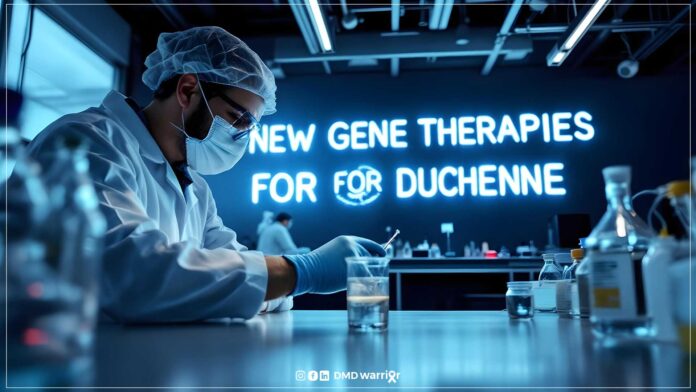The results of new gene therapy studies for Duchenne muscular dystrophy disease will be watched by curious eyes in 2025. The trial phases of Genethon GNT-0004, RegenxBio RGX-202 and Solid Biosciences SGT-003 gene therapies are being followed with interest by families. These new gene therapies for Duchenne hold promise for families.
Table of Contents
The prohibitive cost of Elevidys, developed by Sarepta Therapeutics and granted expanded approval by the FDA about a year ago, and the failure of some children with DMD to pass antibody testing are driving families toward new gene therapies.
Duchenne patients are keeping a careful eye on the outcomes of novel gene treatments for DMD.
New Gene Therapies Like Elevidys
Trials of the Genethon GNT-0004, RegenxBio RGX-202 and Solid Biosciences SGT-003 gene therapies are still ongoing, and judging by the announcements made by the companies, the studies are evaluated positively so far. [Read More: Frequently Asked Questions About Elevidys]

Let’s remember the new gene therapies that will be an alternative to Elevidys.
Solid Biosciences SGT-003
SGT-003, developed by Solid Biosciences, is a promising gene therapy treatment for Duchenne muscular dystrophy (DMD). This innovative therapy works by delivering a functional micro-dystrophin gene to muscle cells, which can help restore muscle function and slow the progression of the disease. By targeting the root cause of DMD at the genetic level, SGT-003 has the potential to significantly improve the quality of life for patients with this debilitating condition.
According to information published by Solid Biosciences on its Clinical Trials page, 43 people are participating in the study. It is reported that SGT-003 clinical trials will begin in May 2024 and the first phase of the study will conclude approximately in May 2027. [Read More]
Learn More: Solid Biosciences Releases Information on Clinical Trial for SGT-003 Gene Therapy
RegenxBio RGX-202
RegenxBio RGX-202 among new gene therapies for duchenne is a groundbreaking gene therapy treatment that has shown promising results in clinical studies. This innovative therapy aims to target and correct genetic mutations that cause a range of debilitating diseases. By utilizing a viral vector to deliver functional copies of the faulty gene, RGX-202 has the potential to provide long-lasting and potentially curative effects for patients suffering from genetic disorders. [Read More]
RGX-202 is a possible best-in-class experimental gene therapy intended to improve function and outcomes in Duchenne, per the information supplied by REGENXBIO. With a differentiated microdystrophin construct that encodes important areas of naturally occurring dystrophin, such as the C-Terminal (CT) domain, RGX-202 is the only gene treatment for Duchenne that is either approved or in late-stage development. Preclinical research has demonstrated that the CT domain enhances the muscle’s capacity for self-healing and shields it from stress brought on by contractions.
Genethon GNT-0004
Genethon GNT-0004 is a novel gene therapy developed by Genethon, a leading biotechnology company specializing in genetic medicine. This groundbreaking treatment aims to target and correct genetic mutations that cause a variety of rare genetic disorders. With its innovative approach and promising results in preclinical studies, Genethon GNT-0004 has the potential to revolutionize the treatment of genetic diseases and improve the lives of patients worldwide. [Read More]
“The outcomes of treatment with our GNT0004 gene therapy are very positive in patients treated at the higher of two doses, both in terms of micro-dystrophin expression and clinical improvement,” noted Frederic Revah, CEO of Genethon. This particular dose, which is smaller than those utilized in other gene therapy trials for DMD, is also what makes our product strong. GNT0004 may be the most effective curative gene therapy available for DMD.
“These clinical results show that gene therapy can provide solutions to one of the most complex genetic diseases,” Dr. Revah underlined. In the second quarter of 2025, we hope to begin the confirmatory (pivotal) phase in over 60 children in Europe, with the US to follow.
Potential impact of new gene therapies for Duchenne
Gene therapies offer promising potential for transforming the lives of individuals with Duchenne, providing hope for a brighter future. As we look ahead, it is crucial to address the challenges and obstacles that stand in the way of bringing these therapies to market, ensuring that they are safe, effective, and accessible to all who need them. By fighting together, we can make strides towards a world where Duchenne is no longer a devastating diagnosis, but a condition that can be effectively managed and treated.
Continued investment in research and development is essential to unlock the full potential of these innovative treatments and bring them to the patients who need them most. Collaboration between scientists, clinicians, and industry partners is key to overcoming the hurdles that currently limit the widespread adoption of gene therapies for Duchenne. By pooling our resources and expertise, we can accelerate the pace of progress and ensure that these life-changing therapies reach those who are waiting for them. The future of Duchenne treatment is bright, but it will require dedication, persistence, and collaboration to make it a reality.
Learn More: Next Generation Exon Skipping Therapies for Duchenne Muscular Dystrophy




Aké budú ceny: SGT-003 a GNT 0004
Žiaľ, zatiaľ to nikto nevie.
Hello Sir/Ma’am,
This is Sandeep, I am from India. My son is suffering for DMD and he diagnosed in last year July 2024.
I requested to you please help us and support to get treatment for DMD.
ابني عمره 8 سنوات ونصف يعاني من DMD يستطيع المشي اريد تسجيله لاخذ العلاج انا من الاردن
To participate in clinical trials, you must first follow which clinical trials are active. You can follow these on the websites below.
https://www.clinicaltrialsregister.eu/ctr-search/search?query=duchenne
https://clinicaltrials.gov/search?cond=Duchenne&sort=StudyFirstPostDate
Once you have found the clinical trials that your child is eligible for, you should read the Eligibility Criteria section carefully.
Each clinical trial page has a contact address. If the contact address is not published, we recommend that you send an e-mail to the e-mail address on the official page of the company conducting the trial.
We recommend that you visit the page we have shared below frequently. This page is updated weekly.
https://dmdwarrior.com/dmd-treatments/
Dear:Sir/Ma’am
My son is today diagnosed for DMD,is the any help please….kanallah.🤲
This very very sad for my and my family.
انا من السودان تم تشخيص ابني منذ سبتمر العام 2024 بمرض ضمور العضلات دوشين الحذف 45 ابني وحيد ليس لدي غيره من الابناء عمره الان 12 عام بدأت الاعراض تظهر عليه بشدة
انا مطلقة من والده افنيت كل عمري في تربيته ورعايته ليكون لي سند لكن القدر كان له كلمة اخرى لا استطيع النوم وفقدت طعم الحياة منذ تشخيص عماد ادعو له